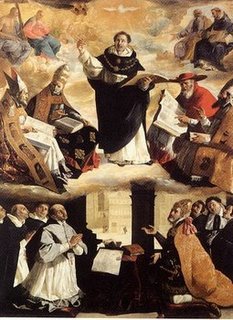St. Thomas Aquinas
JMJ+D 
Thanks to Danny for reminding me about the feast of St. Thomas Aquinas usually celebrated on January 28 unless it falls on a Sunday like today.
Here is an excerpt of an excellent article written by the Dominican priest, Fr. Brian Mullady called "The Angelic Doctor - Thomas Aquinas". Fr. Mullady has been a regular guest in EWTN and is an excellent preacher.
St. Thomas is called the "Angelic Doctor" because he wrote a great deal about angels. Indeed, his use of the philosophy of Aristotle to distinguish essence and existence in angels (to show how they could be created, but without matter) was among his principal contributions to the history of philosophy.
St. Thomas has been called the "Common Doctor" because he unified Scripture, the Fathers of the Church, and philosophy in a neat synthesis that scholars have studied ever since.
He is called "Divine Thomas" because those who have studied his works feel they have met not only a genius, but someone who must have been inspired by God to write as much as he did with such depth, power, and faith.
It is a sign of his humility that he almost never shines through his voluminous pages personally, but rather sticks to the objective problem. Thus he reverses the egoism of our existentialist age, which tends in some cases to sacrifice the truth in favor of personal experience. Bishop Fulton Sheen, a great Thomistic scholar, once remarked that the problem of modern philosophy is that modern thinkers tend to view the universal as "an impoverished sense experience." The rose smells less sweet because it can be defined. Such a position has more in common with Kant than with Aquinas, who defines salvation as "the enjoyment of God."
More from here.

Thanks to Danny for reminding me about the feast of St. Thomas Aquinas usually celebrated on January 28 unless it falls on a Sunday like today.
Here is an excerpt of an excellent article written by the Dominican priest, Fr. Brian Mullady called "The Angelic Doctor - Thomas Aquinas". Fr. Mullady has been a regular guest in EWTN and is an excellent preacher.
St. Thomas is called the "Angelic Doctor" because he wrote a great deal about angels. Indeed, his use of the philosophy of Aristotle to distinguish essence and existence in angels (to show how they could be created, but without matter) was among his principal contributions to the history of philosophy.
St. Thomas has been called the "Common Doctor" because he unified Scripture, the Fathers of the Church, and philosophy in a neat synthesis that scholars have studied ever since.
He is called "Divine Thomas" because those who have studied his works feel they have met not only a genius, but someone who must have been inspired by God to write as much as he did with such depth, power, and faith.
It is a sign of his humility that he almost never shines through his voluminous pages personally, but rather sticks to the objective problem. Thus he reverses the egoism of our existentialist age, which tends in some cases to sacrifice the truth in favor of personal experience. Bishop Fulton Sheen, a great Thomistic scholar, once remarked that the problem of modern philosophy is that modern thinkers tend to view the universal as "an impoverished sense experience." The rose smells less sweet because it can be defined. Such a position has more in common with Kant than with Aquinas, who defines salvation as "the enjoyment of God."
More from here.


0 Comments:
Post a Comment
<< Home